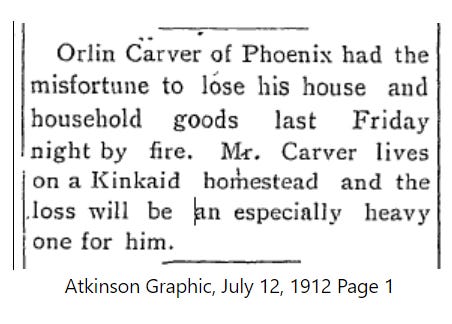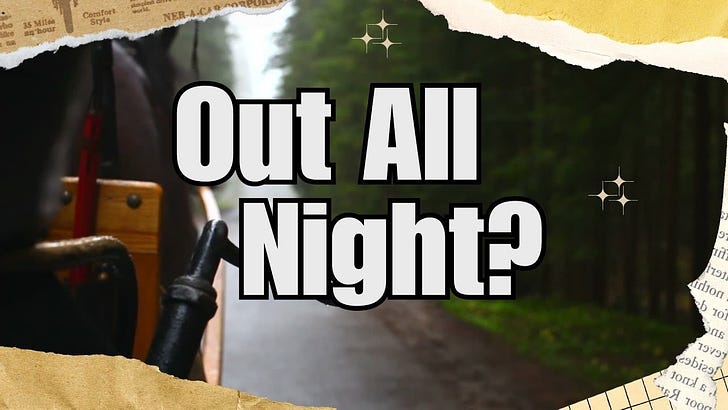Finding Overlooked Stories in Old News Archives
What I learned about a 14-year-old girl and a small town trial.
During Covid, digitized newspapers proliferated at a surprising rate.
Don't you just love that word, proliferate? It reminds me of school, back when they used to talk about the arms race, and the proliferation of nuclear weapons, only this is a newspaper race, which is way better.
My early search technique was somewhat haphazard. I didn't understand the best search methods. I didn't have a good system for saving what I found. And I didn't keep proper track of where I'd been and what I had already looked for.
Mind you, there's nothing wrong with repeating a search if you're doing it intentionally, but repeating it unintentionally? That just sends people my age over to webMD to look up the symptoms of dementia.
So I realized I needed a systematic approach, some education, and a good directory of the newspapers I use most. For the time period I've been researching, these were primarily in the United States and Canada.
Finding the Newspapers
My favorite website for finding US newspapers is the Ancestor Hunt site at https://theancestorhunt.com.
Kenneth H. Marks keeps this updated. He also provides blog posts with search tips. From the main website, look for the link to historical newspapers.
For free newspapers in the United States, I also like the Chronicling America 2.0 "beta" website. If it still shows as “beta” when you read this, don't let that stop you! This is an upgrade from the previous offering. Here’s the link: https://www.loc.gov/collections/chronicling-america/.
There are also subscriptions sites such as newspapers.com, genealogy bank.com and newspaperarchives.com. My favorite of these is newspapers.com, but it really depends on what papers you need to search. You can often get a trial subscription to these to figure out whether their selection meets your needs.
Many local libraries provide free access to a subset of some subscription offerings as well. And sometimes the local library will also hold the keys to the digital archives for the local town newspaper. For example, with my Seattle Public Library card, I can log in and see old issues of the Seattle Times and Post Intelligencer.
Finding the News Items
I’ve been following my dad’s journal, where he and his brother tried to piece together their childhood movements. My goal is to match these memories with real places and news articles. This type of search is a little different than searching for a specific event, such as an obituary.
In this video I take you along on one of my searches, starting with an early broad search, and moving along from there. At first I was just searching for the family, but once I found out about the trial, I wanted to find an article that told me more about it.
In the end, I did find a key article. I searched for the neighbor who was on trial, Frank Hamilton. This was a search I had tried before, but this time I got more results. There may be several reasons for this — new papers added, old issues rescanned, or perhaps search algorithm updates.
Whatever the reason, now we finally know what happened the night of September 6, 1911, when that middle-aged neighbor kept little Susie out all night. Well, actually, we know what she says, and we know what he says, and we know what the jury decided.
I reveal it all at the end of the video.
Reveal. I don’t like that word nearly as well as proliferate, because these days every third YouTube video and blog post claims to reveal a secret that nobody else has ever told you.
On the other hand, I’ll bet nobody else has ever told you what happened at Frank Hamilton’s trial. So …
My List of Search Tips
These did not originate with me. I’ve memorized them after reading numerous other articles over the years. They are not exhaustive, but they are the tips that have worked best for me.
Start Wide, Then Focus
When I’m first looking for the family in a new area, it’s useful to do a fairly broad search.
For example, I might search for a last name, with a generous time frame, and just see what comes up. This search strategy works best on a targeted area (one newspaper, or one small group of newspapers) when the name is not extremely common.
Common names may return too many results to be practical, giving you a long, tedious list of potential articles.
Begin with a wide search to understand what's available
Works best with uncommon surnames.
Helps identify key time periods.
Shows which newspapers covered your area.
Gradually narrow your search with:
Date ranges
Location specifics
Additional family names
Name Variations Matter
I enrolled in one of Kenneth H. Marks’ webinars. He talked about the fact that different font families (used in various old papers) will have different OCR errors. Here is an article that expands on this topic: https://blog.newspapers.com/ocr-strategies/. The idea is to learn to search with misspelled words on purpose, like "Rohert" instead of "Robert", to see if that finds things that the OCR misunderstood.
And of course, there are nicknames, and first name abbreviations, and the times where the newspaper was likely to misspell something. For instance, my grandfather's name was Orland. The newspapers liked to change this to either Orlin or Orlando. So I search for both of these.
Watch for common OCR misreads:
"b" → "h" (Robert → Rohert)
"rn" → "m" (corn → com)
"li" → "h" (William → Wiham)
Try multiple name formats:
William, Will, Bill, Wm.
Elizabeth, Lizzie, Beth, Eliza
McDowell, M'Dowell, MacDowell
Beyond Direct Family
If you can't find the exact person you're looking for, sometimes you can find other family members, and when you do, your person may be listed as well, perhaps with a name misspelled. This is one place where a family tree comes in handy, or at least a full list of family members, even if it isn't in official "tree" format.
And if you're working with something like a court case, where multiple parties are involved, keeping a list of these other parties can be useful.
Consider searching for neighbors when:
Family was involved in community events.
Local incidents affected multiple families.
Your relatives were witnesses or participants.
You hit a dead end with family searches.
Smart Search Techniques
If you are searching a newspaper archive, look for the website's FAQ to see what specific search techniques are recommended. Some allow wildcards and some don't. And usually if they do, they will give some examples.
Use wildcards (* or ?) when available.
Try searching without first names, or sometimes with just the first name if unique.
Include street names or townships.
Search for significant dates (and a few days before and after the date).
Check multiple local papers, including papers in nearby towns.
Sometimes searches that provided no results previously will provide results if you try again later. Perhaps this is because more newspaper issues were added or for some other technical reason.
Document Your Finds
This used to be my downfall.
I would "Clip" articles at the newspaper site then forget to come back and save them properly to my hard drive. And I cannot stress how often I've seen clipped articles from my family — out of the physical newspaper — that have no indication of the publication name or date. This is easy to do accidentally with clippings of articles taken as screen shots as well.
Best practice: add that newspaper name and date to image files before sending them to others. You can do this with photo manipulation software or a website such as Canva.com. Or you can do what I do:
Paste the clipping into a word processor.
Type the publication info below that.
Then take a new screen shot of the clipping plus publication info
Save that as an image
It’s a terrible hack that no purist would ever approve of. I use it all the time.

Things to remember:
Save articles immediately.
Note newspaper name, date, link to the article.
Track successful search terms.
Record name variations that worked.
What's your best newspaper research discovery? I would enjoy hearing your finds and search tips in the comments below. As for my continued search to match up my Dad’s journals, after Holt County, I started following the family around Kansas, Oklahoma, and Missouri. We’ll catch up with them again soon.




I do the same terrible hack to my clippings too! I consider it better than nothing but certainly not ideal. Great tips in here for searching!